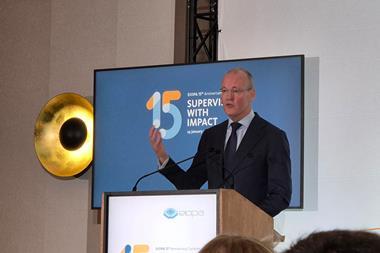GERMANY - The head of fixed income structured products at German pensions giant Bayerische Versorgungskammer (BVK) has strongly criticised the mindset of viewing any fixed income investment as risk-free.
Speaking yesterday at a conference organised by Allianz Global Investors, Constantin Echter, head of fixed income structured products and spread investments, said buy-and-hold fixed income strategies had previously been perceived as falling within said risk-free approach.
"After Lehman, this no longer existed - this became a stupid idea," he said. "We in the past never had risk-free assets - there was always a default probability for every issuance, and always, in the future, we will never have risk-free assets."
Echter said it was time to move away from the notion of a "no risk sovereign" and that the assets should instead be divided into low and high-yield bonds.
Speaking during the same panel debate, AGI's chief investment officer for Europe Ingo Mainert noted that the crisis had also resulted in a renewed home bias from many investors.
"I was personally surprised that this was not a bigger topic because, if you go back to the second half of the 1990s when this euro story and European story came into the market - that we will see one credit market, for example - the start of the European credit market was in 1998 or 1999.
"Now, in the last six or 12 months, a lot of that progress was diminished."
Echter said that, for the BVK, the opposite was true, with a shift towards covered bonds from countries such as Canada and Australia, as well as allocation towards emerging market debt.
He added that the BVK had increased its emerging market and high-yield fixed income exposure at the beginning of the year, and that all investments in the class were assessed using a traffic-light system, with this year's investments taking place at a time when the asset class was firmly in the green.
"I would say we are now not green anymore, we are more green-yellow," he said. "This means we will not allocate further money to high yield, but we will not reduce at the moment. It could be possible in 6-8 months that we will reduce high yield."
Asked how easy it was to react to change in an era of what had previously been described as financial repression, Echter dismissed the idea of the BVK investing based solely on one particular scenario.
"It is impossible for us to allocate the portfolio towards a 'financial repression' scenario because, whether or not we get financial repression, this is a very aggressive strategy to focus on just one scenario when our main goal is a well-diversified portfolio."












